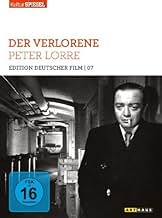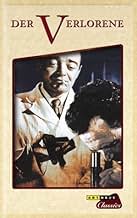Der Verlorene
- 1951
- 1 घं 38 मि
IMDb रेटिंग
7.0/10
1.2 हज़ार
आपकी रेटिंग
अपनी भाषा में प्लॉट जोड़ेंGerman scientist murders his fiancée during World War II when he learns that she has been selling the results of his secret research to the enemy.German scientist murders his fiancée during World War II when he learns that she has been selling the results of his secret research to the enemy.German scientist murders his fiancée during World War II when he learns that she has been selling the results of his secret research to the enemy.
- पुरस्कार
- 1 जीत और कुल 1 नामांकन
Helmuth Rudolph
- Colonel Winkler
- (as Helmut Rudolph)
Eva Ingeborg Scholz
- Ursula Weber
- (as Eva-Ingeborg Scholz)
Peter Ahrweiler
- Oberstleutnant Marquardt
- (बिना क्रेडिट के)
Josef Dahmen
- Lieske, canteen bartender
- (बिना क्रेडिट के)
Helmut Eichberg
- Oberstleutnant Bydersahn
- (बिना क्रेडिट के)
Kurt Fuß
- Baldheaded Man
- (बिना क्रेडिट के)
Joachim Hess
- Leutnant
- (बिना क्रेडिट के)
Richard Münch
- Criminal Inspector #1
- (बिना क्रेडिट के)
फ़ीचर्ड समीक्षाएं
10pyamada
Lorre, perhaps like Charles Laughton, had only this chance to direct. Like Laughton, Lorre made an excellent film, and encountered no problems whatsoever concerning complete control of the film, unlike Laughton, whose film was given a crude ending as a gift from the studio. This is a beautiful, poetic movie about horrible subjects, and the complicated reactions and perspectives one will have about these characters, especially Lorre's, teaches us much about Germany, the Nazis and aspects of the war in general. While there are passing similarities in content to Wilder's A Foreign Affair, Die Verlorne is so much the better movie, so much more poetic (perhaps than anything Wilder ever did), and so moving, in brutal ways, that it just has to be considered one of the best and most powerful and most depressing films ever made.
This unique German noir is a weird film, to say the least. A doctor at a vaccination clinic makes an interruption in his work, when another doctor comes there to assist him, who is a dark shadow out of his past. During the war he was a researcher achieving great findings and results, and that suddenly appearing man was his assistant, stealing his research results and selling them to the enemy, using his betrothed for a bait, so he stole both his work and his fiancée. Peter Lorre is the doctor who can't forgive his betrothed for her treason, so he strangles her in the most sensitive scene of the film (without showing the strangulation - it is only reported afterwards,) and from that moment on he is a lost man. All this is shown in flashbacks, as Lorre has a long talk with his old colleague while drinking and smoking, sorting things out, to reach a settlement. The film and the story is complicated, the flashbacks are confusing, the story involves both Nazi plots, bombings of Hamburg, another improvised murder, proving the liability of the psychopath Peter Lorre has grown into, and everything is draped in very dark shadows and abysmal moods, the character of the film is apocalyptic, and shadows play an important part in the cinematography. It is fascinating and weird, deeply disturbing and melancholy at the same time, poignantly pinpointing the mood of post war Germany among the ruins of both Hamburg and people, in a world where no one can feel at home or safe or any security any more.
10vferenz
Der Verlorene is an extraordinary film noir not only as text but also in its context. This film disappeared after only ten days from german screens although most critics said that it´s the best german film after WW II. The reasons are very simple: First, it was too late. This film five years earlier in 1946 would have been the Trümmerfilm par excellance. Compare it to Die Mörder sind unter uns and you will see the huge difference. Second, in the upcoming era of Wirtschaftswunder no one in whole Western Germany wanted a reminder on what their industry and morality was build on: the Third Reich. Consider this, when Marlene Dietrich came back to Germany many people shouted: Go home! In the 1950s one producer said about Fritz Kortner: Hitler could have burnt more Jews. This way of thinking wasn´t elimated and still it´s not. Nowadays WW II is good for action flics (Saving Private Ryan and all this crap) or love stories (for example this desaster Enemy at the Gates). It´s depressing but one shouldn´t get mad over it. Just see Der Verlorene and you will see there were people how to handle this topic in an adequate manner. Maybe there are some filmmakers out there who still know. Let´s hope for it.
So heavy and so depressing, as any post-World War II German film - with flashbacks - would be.
Peter Lorre, in real life addicted to morphine, came out of rehab and returned to Germany, where he directed and starred in a film, The Lost Man, in 1951.
Lorre is a scientist, Dr. Karl Rothe, who after the war was presumed dead and therefore was able to change his name to Neumeister. During the Nazi era, he learns from those over him that his discoveries are being sold to the enemy - by his fiancee.
In a rage, he strangles her. Now he works as a doctor in a refugee camp, but is reminded of his past in the presence of the man who was his assistant during the war, Hosch, who was involved in the investigation of The Night of the Long Knives.
The "Night Of The Long Knives" was a series of political extrajudicial executions intended to consolidate Hitler's power and alleviate the concerns of the German military about the role of Ernst Röhm and the Sturmabteilung (SA), the Nazis' paramilitary organization, known colloquially as "Brownshirts."conspiracy.
That Neumeister has become completely unstable is demonstrated not only in his narration of the flashback, in which he tells Hosch that he intended to kill him, but in his problems with women. At one point, he murders a woman while on a train.
Lorre did a magnificent job in both his acting and direction. The end of the film is just as miserable as the rest of it. It's powerful, but don't have any sharp objects in the house.
Peter Lorre, in real life addicted to morphine, came out of rehab and returned to Germany, where he directed and starred in a film, The Lost Man, in 1951.
Lorre is a scientist, Dr. Karl Rothe, who after the war was presumed dead and therefore was able to change his name to Neumeister. During the Nazi era, he learns from those over him that his discoveries are being sold to the enemy - by his fiancee.
In a rage, he strangles her. Now he works as a doctor in a refugee camp, but is reminded of his past in the presence of the man who was his assistant during the war, Hosch, who was involved in the investigation of The Night of the Long Knives.
The "Night Of The Long Knives" was a series of political extrajudicial executions intended to consolidate Hitler's power and alleviate the concerns of the German military about the role of Ernst Röhm and the Sturmabteilung (SA), the Nazis' paramilitary organization, known colloquially as "Brownshirts."conspiracy.
That Neumeister has become completely unstable is demonstrated not only in his narration of the flashback, in which he tells Hosch that he intended to kill him, but in his problems with women. At one point, he murders a woman while on a train.
Lorre did a magnificent job in both his acting and direction. The end of the film is just as miserable as the rest of it. It's powerful, but don't have any sharp objects in the house.
After eighteen years in exile Peter Lorre returned to the land of his birth for his one and only stab at directing. Based upon a newspaper article about a doctor who had killed his assistant and then stepped in front of a train, Lorre has fashioned a screenplay with the help of novelist Benno Vigny and esteemed director Helmut Kautner.
Like so many actors who take up directing he is very generous to his players and in particular allows his five actresses to shine. Individual scenes are extremely effective but these alas are achieved at the expense of overall structure. Despite oodles of atmosphere from superlative lighting cameraman Vaclav Vich, the film is weakened by a verbose script and an intrusive, over-orchestrated score. Suffice to say Lorre is riveting as Dr. Rothe but the entire enterprise required a firmer hand at the helm.
This is a film that Lorre evidently felt compelled to make but this bleak allegory of Germany's fatal flirtation with National Socialism and the nation's collective guilt in the person of a serial murderer was hardly likey to be welcomed by audiences of the time and such proved to be case.
That it has a haunting quality is undeniable and remains, in the words of David Thomson, "a direct imprint of a very troubled soul."
Like so many actors who take up directing he is very generous to his players and in particular allows his five actresses to shine. Individual scenes are extremely effective but these alas are achieved at the expense of overall structure. Despite oodles of atmosphere from superlative lighting cameraman Vaclav Vich, the film is weakened by a verbose script and an intrusive, over-orchestrated score. Suffice to say Lorre is riveting as Dr. Rothe but the entire enterprise required a firmer hand at the helm.
This is a film that Lorre evidently felt compelled to make but this bleak allegory of Germany's fatal flirtation with National Socialism and the nation's collective guilt in the person of a serial murderer was hardly likey to be welcomed by audiences of the time and such proved to be case.
That it has a haunting quality is undeniable and remains, in the words of David Thomson, "a direct imprint of a very troubled soul."
क्या आपको पता है
- ट्रिवियाPeter Lorre's only film as director
- क्रेज़ी क्रेडिटExplanatory caption (in German) in opening credits: This film is not a work of fiction. The events are based on factual reports from the last few years.
- इसके अलावा अन्य वर्जनThere is an Italian edition of this film on DVD, distributed by DNA srl, "UN UOMO PERDUTO (1951) + CRIME AND PUNISHMENT (Ho ucciso!, 1935)" (2 Films on a single DVD), re-edited with the contribution of film historian Riccardo Cusin. This version is also available for streaming on some platforms.
- कनेक्शनFeatured in Displaced Person - Peter Lorre und sein Film 'Der Verlorene' (2007)
टॉप पसंद
रेटिंग देने के लिए साइन-इन करें और वैयक्तिकृत सुझावों के लिए वॉचलिस्ट करें
विवरण
- चलने की अवधि1 घंटा 38 मिनट
- रंग
- ध्वनि मिश्रण
- पक्ष अनुपात
- 1.37 : 1
इस पेज में योगदान दें
किसी बदलाव का सुझाव दें या अनुपलब्ध कॉन्टेंट जोड़ें





























